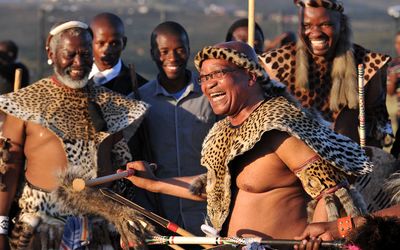Traditional leaders should not lodge competing land claims, Zuma says
by Staff Writer,
2016-03-03 14:40:17.0
PRESIDENT Jacob Zuma has asked traditional leaders‚ as custodians of tribal land‚ to improve farming of underutilised land to ensure food security, and to work with communities on land claims instead of lodging competing claims.
Addressing the annual opening of the National House of Traditional Leaders in Parliament‚ Mr Zuma said the Department of Rural Development and Land Reform was finalising business plans for all the 44 districts in the country where agricultural parks — known as agri-parks — would be established.
One of the strategic objectives of the parks was to bring underutilised land‚ especially in communal areas‚ into full production within three years and expand irrigated agriculture.
The government had also developed an agricultural policy action plan under which food security at household level should be achieved through the use of 1-million hectares of the communal land for food production.
"We have noted that some of the productive communal land under traditional councils remains inadequately utilised," Mr Zuma said. "I urge traditional leaders to encourage communities to plough and till the productive land so that they can produce healthy food for their families and reduce the levels of food insecurity and poverty that are so prevalent."
Commenting on land reform‚ he reiterated his message from last year that traditional leaders unite their efforts in claiming land on behalf of the communities they lead, which was taken away‚ rather than lodging competing claims.
"I have been informed that some work in this regard has started‚ championed by the National House of Traditional Leaders," Mr Zuma said.
"I strongly believe that access to land and security of land tenure are key to development‚ especially agricultural development … I urge traditional leaders to thoughtfully and actively engage with the matter of land reform on behalf of the communities they lead.
"I am raising this as we can talk about agriculture and food security but without access to land‚ our people cannot plough and feed themselves or contribute to economic growth," he said.
TMG Digital

President Jacob Zuma at a traditional ceremony at his home in Nkandla, KwaZulu-Natal. Picture: ELMOND JIYANE
PRESIDENT Jacob Zuma has asked traditional leaders‚ as custodians of tribal land‚ to improve farming of underutilised land to ensure food security, and to work with communities on land claims instead of lodging competing claims.
Addressing the annual opening of the National House of Traditional Leaders in Parliament‚ Mr Zuma said the Department of Rural Development and Land Reform was finalising business plans for all the 44 districts in the country where agricultural parks — known as agri-parks — would be established.
One of the strategic objectives of the parks was to bring underutilised land‚ especially in communal areas‚ into full production within three years and expand irrigated agriculture.
The government had also developed an agricultural policy action plan under which food security at household level should be achieved through the use of 1-million hectares of the communal land for food production.
"We have noted that some of the productive communal land under traditional councils remains inadequately utilised," Mr Zuma said. "I urge traditional leaders to encourage communities to plough and till the productive land so that they can produce healthy food for their families and reduce the levels of food insecurity and poverty that are so prevalent."
Commenting on land reform‚ he reiterated his message from last year that traditional leaders unite their efforts in claiming land on behalf of the communities they lead, which was taken away‚ rather than lodging competing claims.
"I have been informed that some work in this regard has started‚ championed by the National House of Traditional Leaders," Mr Zuma said.
"I strongly believe that access to land and security of land tenure are key to development‚ especially agricultural development … I urge traditional leaders to thoughtfully and actively engage with the matter of land reform on behalf of the communities they lead.
"I am raising this as we can talk about agriculture and food security but without access to land‚ our people cannot plough and feed themselves or contribute to economic growth," he said.
TMG Digital





















Change: -0.47%
Change: -0.57%
Change: -1.76%
Change: -0.34%
Change: 0.02%
Data supplied by Profile Data
Change: -1.49%
Change: 0.08%
Change: -0.47%
Change: 0.00%
Change: -0.04%
Data supplied by Profile Data
Change: -0.34%
Change: 0.03%
Change: -0.10%
Change: -0.22%
Change: -0.81%
Data supplied by Profile Data
Change: -0.28%
Change: -1.15%
Change: -0.07%
Change: -1.21%
Change: -0.22%
Data supplied by Profile Data